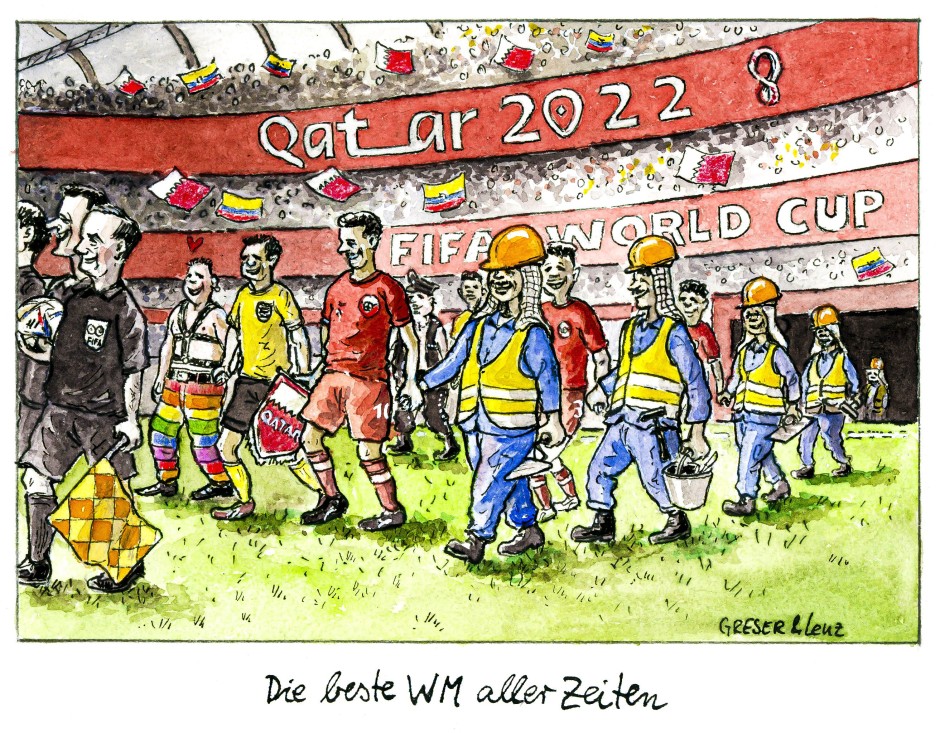
AThe soccer World Cup begins in Qatar on Sunday. 32 teams will play in eight groups for a place in the knockout phase, two teams will then face each other in the final on December 18th in the Lusail Stadium for the highest international football title.
There are many reasons to talk about this tournament even before the opening game between Qatar and Ecuador (5 p.m. CET in the FAZ live ticker for the soccer World Cup, on ZDF and on MagentaTV). But the same debates are far from being held in every country – and by no means every debate comes to the same conclusion.
USA: consolation prize instead of protest
The scale of antipathy to “sportswashing” reached a new high this year in the United States. The Saudi sovereign wealth fund is creating a lot of resentment with its multi-million dollar LIV golf tournament series, with Donald Trump as its mascot and the intention to break the supremacy of the American PGA Tour. In comparison, even the critical voices in the country on the subject of the football World Cup in Qatar appear to be quite subdued.
Sure, US Soccer will display its own emblem on the walls of the Ar-Rayyan neighborhood in rainbow colors: a solidarity action for LGBTQ+ people and a symbolic act of resistance against the host regime, which throws gays in prison. But nothing more can be expected.
When the American association lost in the vote of the world governing body FIFA in 2010 and rumors of sinister machinations quickly began to circulate, protest did not seem opportune. The United States operates its largest military base in the Middle East in Qatar’s capital, Doha. The consolation prize: In 2026 the World Cup will take place in Mexico, Canada and the USA, in summer, when attention is not drawn to football, basketball and ice hockey and the national team looks more promising. Glad to be there this time. (Jürgen Kalwa, New York)
Tunisia and Morocco: “Hate and Envy”
Small Tunisia with only around eleven million inhabitants has qualified for the World Cup for the sixth time. At the last minute, participation seems questionable because the world association FIFA accuses the government in Tunis of having its sports minister interfere in the internal affairs of the national football association TFF. The topic dominates the football scene. The allegations against Qatar are irrelevant. On the contrary.
The Qatari government received support from the Tunisian Islamists. The Ennahda party condemned the “racist defamation campaigns” the host country was facing from the West. They are an expression of hatred and envy of a small Arab country that organizes such a prominent sporting event.
In Morocco the eyes are spellbound on the “Lions of the Atlas”, who are also taking part in a World Cup for the sixth time. The team was eliminated in Russia 2018 as the last group. Criticism of Qatar in public? Difficult to imagine. The discussion is more about the chances of selection and about the violence of Moroccan “ultras”. (Hans Christian Roessler, Madrid)
Senegal, Ghana and Cameroon: One knee in the center
It’s the big issue in Senegal: Sadio Mané’s knee. The Bayern striker embodies the dreams of millions of young Africans. The online medium Dakaractu wrote about the violation as “the character of a state affair”. Wild conspiracy theories made the rounds. Reports of poor treatment of Senegalese workers on construction sites in Qatar, while causing outrage, have long since been forgotten. Nobody thinks of a boycott.









